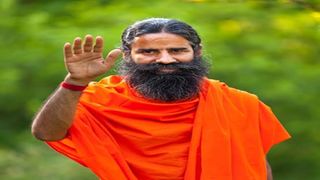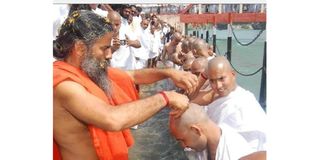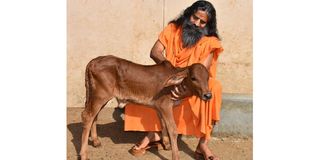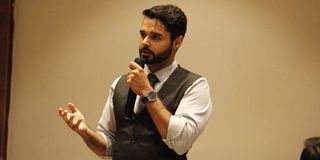
Baba Ramdev, the founder of Patanjali Ayurved Hospital, India’s most prominent and successful traditional medicine empire.
| PoolWorld
Premium
India’s Covid-19 crisis tests role of traditional medicine
For hundreds of years, most societies across the world relied on traditional medicine and indigenous healing practices to cure ailments.
But as science gave birth to modern medicine, most of them evolved and shifted from these practices, with some communities keeping certain aspects of traditional medicine.
In India, for example, the world’s second most populous nation and one renowned for medical tourism, a Covid-19 crisis that nearly crashed its healthcare system, has forced renewed focus on the place of traditional healing practices.
Locally known as Ayurveda, Indian traditional medicine is now being seen as a possible line of defence against Covid-19, even as the country remains at the forefront of advancing scientific medicine through the manufacture of coronavirus vaccines.
Baba Ramdev
The push to ‘basics’ is being led by local yoga teacher and businessman Swami Ramdev, commonly referred to as Baba Ramdev.
Mr Ramdev is the founder of a local traditional medicine hospital known as Patanjali Ayurved. But he has come under criticism for disseminating ‘false information’ for arguing that modern pharmaceuticals had “failed science” after many people died in India recently from Covid-19 and from using medicines.

Baba Ramdev, the founder of Patanjali Ayurved Hospital, India’s most prominent and successful traditional medicine empire, shaving his followers .
The Delhi High Court on Thursday issued summons to the yoga guru after the local medical association accused him of spreading false health information. Despite this, it seems many people are buying into Ramdev’s Ayurveda gospel.
“With a population of more than 130 million illiterate and semi-literate people, the country is unable to effectively spread messages on Covid-19 guidelines, awareness and safety precautions especially in the rural areas. This is where Ayurveda comes in,” Dr Narendra Goyal, an Indian wellness researcher in Udaipur, Rajasthan India, told Nation.Africa in a virtual interview.
Mr Ramdev argues that health and wellness are Siamese twins that depend on a delicate balance between the mind, body and spirit. His traditional medical approach is to promote good health, rather than the ability to just fight one disease.
Intensive care
That may make sense, especially in India’s culture where yoga is promoted for wellness.
At his hospital, he sells everything from toothpaste and medicines to oils, lotions and clothes. Earlier this year, the hospital launched a herbal remedy known as Coronil, which Mr Ramdev says can tame the adverse effects of Covid-19 that often lead to hospitalisation in intensive care.
At the launch, the Indian government, represented by Health Minister Harsh Vardhan, an allopathic doctor and the chair at the time of the executive board of the World Health Organization (WHO), attended.
Developed more than 3,000 years ago, India’s traditional medicine targets ‘holistic’ health. Dr Narendra Goyal, a wellness researcher in Udaipur, Rajasthan, says the practice seeks to strengthen the health of the entire body and mind, and may involve herbs, oils, exercises or meditation.
India, one of the largest manufacturers of modern medicines, has 250,000 registered medical practitioners of the Ayurvedic system compared with 700,000 practising modern medicine.
Some 20,000 medicinal plants have been recorded. However, traditional practitioners use just about 7,500 plants to cure different diseases, according to Hindawi, a journal for alternative medicine.

Guru Baba Ramdev petting a cow, an animal considered to be a sacred symbol of life in the Vedas (the oldest of the Hindu scriptures) and is associated with Aditi, the mother of all the gods.
Stung by the Covid-19 pandemic, Indian government officials have been promoting ways to build the immune system.
Last month, a committee comprising senior officials and Ayurvedic professionals recommended clinical trials on the controversial Krishnapatnam herbal remedy in treating Covid-19.
Tests, they said, confirmed that oxygen saturation levels had risen in patients after the administration of the herbal eye drops. They could not, however, deduce if that was only because of the herbal preparation.
In fact, administering through eyes posed a potential danger of blindness for long-term users, although patients did not report adverse effects.
As it is, neither the herb nor any other drug has been confirmed to cure Covid-19. Indian officials say, however, that evidence of immune boosters may mean strength to battle the infections, preventing hospitalisation or death.

Dr Narendra Goyal, a holistic living and wellness researcher who also teaches skill development in Udaipur, Rajasthan State, India.
According to the Indian Health ministry website, those methods may include daily practices such as frequent rehydration by drinking lukewarm water, use of herbal seasoning such as ginger and cumin, using essential oils, gargling warm salty water and eating organic, home-cooked meals.
Empty stomach
The website also advises the public to eat a local nutritious jam known as Chyawanprash on an empty stomach, winter cherry, guduchi and herbal tea. Each of these has a recipe provided by the government in a bid to educate the masses.
“You can apply sesame oil or coconut or cow ghee in your nostrils during morning and evening,” says the guideline. Most of these methods have been used for centuries to treat colds and flus and it is hoped they can be a defence.
Dr Goyal told Nation.Africa that some 3,000 people have sought traditional medical remedies, even after surviving Covid-19 as they see it as a future defence booster against repeat infections.
When the pandemic began in early 2020, India’s deaths were low and Dr Goyal says many people could beat mild infections without going to hospital, by using remedies such as Ayush 64, Coronil, Shwasari, Clevira and Divy Pharmacy Kit, which were affordable.
“One more reason behind the popularity of Ayurveda medicines around here in the treatment of Covid-19 is the cost factor. Most Ayurvedic brand medicines are cheaper compared to pharmaceuticals,” he told Nation.Africa on Monday.
“We have seen many of the cases in the country register positive news in the case of Ayurvedic supportive care towards the recovery of Covid-19 patients even when they were oxygen-dependent after they refused the expensive pharma medicines like Fabiflu.”
He also suggested that traditional medicine is also chosen because people want to avoid crowded ordinary hospitals.
So far, it remains an alternative medicine. But India’s scenario could influence the worldview. In September 2020, the WHO, Africa Centres for Disease Control and the AU Commission on Social Affairs (now known as Health, Humanitarian Affairs and Social Development), endorsed a team to create a protocol for Phase II of trials on herbal medicine for Covid-19.
The 25-member committee is meant to provide guidelines for research in Africa and provide evidence to determine if herbal medicine has an impact.
“The adoption of the technical documents will ensure that universally acceptable clinical evidence of the efficacy of herbal medicines for the treatment of Covid-19 are generated without compromising the safety of participants,” said Prof Motlalepula Gilbert Matsabisa, chairman of the expert committee.
“Just like other areas of medicine, sound science is the sole basis for safe and effective traditional medicine therapies,” said Dr Prosper Tumusiime, director of Universal Health Coverage and Life Course Cluster at the WHO Regional Office for Africa.
“The onset of Covid-19, like the Ebola outbreak in West Africa, has highlighted the need for strengthened health systems and accelerated research and development programmes, including on traditional medicines,” Dr Tumusiime said.
Only time will tell whether alternative medicine can catch up with or even substitute modern pharma.





